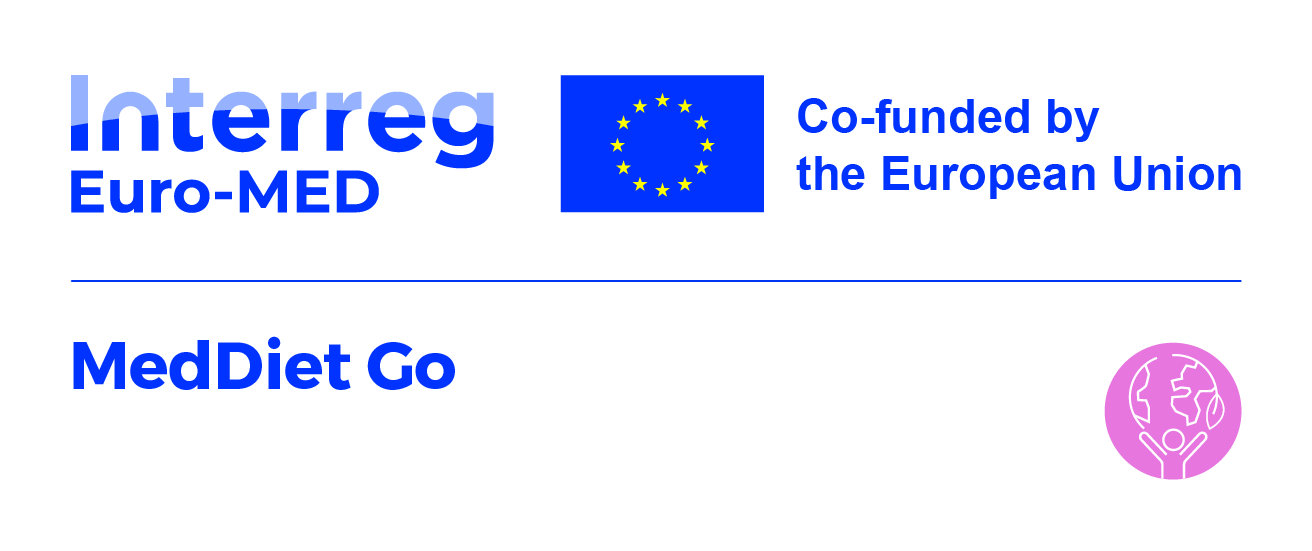The Mediterranean Diet European Cluster is a transnational network aimed at unifying all the agents involved in the Mediterranean Diet; to help them boost their activities with knowledge, tools, and a common strategy.
In a globalized world, the Cluster puts in value the potential asset the Mediterranean Diet can be for small businesses, tourism agents, and producers.
The Mediterranean Diet European Cluster is registered in the European Cluster Collaboration Platform More information
The Vision of the Mediterranean Diet Cluster
The vision of the Mediterranean Diet (MD) Cluster is to activate a long-term, transnational alliance that harnesses the economic, cultural, environmental, and social value of the Mediterranean Diet to shape resilient, inclusive, and innovative rural ecosystems. Rooted in the MD.net project’s holistic approach, the Cluster emerges as a pragmatic and strategic response to global transitions—such as climate change, post-COVID recovery, and digitalization—through the lens of sustainable development. The MD is not only recognized as a UNESCO intangible cultural heritage but is reimagined here as a tangible, systemic model for smart specialization, healthy lifestyles, and eco-conscious entrepreneurship. Its vision integrates agri-food production, hospitality, mobility, and tourism into a cross-sectoral ecosystem guided by the six pillars of the EU Recovery and Resilience Plan, the Green Deal, and the UN 2030 Agenda.
At its core, the MD Cluster aspires to be a platform for integration and empowerment. It strengthens rural economies by connecting micro- and small enterprises with knowledge institutions, training bodies, public authorities, and digital innovators in a “quadruple helix” collaboration. This strategy enhances value chains, supports green and circular businesses, accelerates digital transition, and promotes health-oriented products and services. The vision includes developing critical mass through transnational networking: overcoming the limits of small-scale production by aggregating value across regions and standardizing quality through shared branding (MD Declaration). Importantly, it builds interoperability between fragmented initiatives and territories, offering shared governance, joint actions, and mutual support among Mediterranean regions.
This vision is not merely aspirational—it is grounded in the tangible outcomes of MD.net: four years of co-creation, experimentation, and capitalization have produced tools (databases, living labs, MD Platform), strategic documents (Action Plans, Policy Recommendations), and stakeholder pacts (MD Declaration). The MD Cluster envisions a Europe in which rural communities are no longer peripheral but leading actors in innovation, sustainability, and internationalization. It proposes a future where the Mediterranean Diet is not only preserved, but transformed into a global economic and cultural driver—capable of engaging public institutions, businesses, and civil society in a shared pathway toward prosperity and cohesion.
What is the Med-Diet Eurocluster (MDG Eurocluster)
The Med-Diet Eurocluster is the institutional and operational legacy of the MD.net project—a permanent, transnational structure that connects territories, stakeholders, and sectors around the Mediterranean Diet economy. Built as a “light cluster initiative” with the potential to evolve into a formal legal organization, the MDG Eurocluster embodies the capitalization strategy of MD.net: transforming four years of experimentation, stakeholder engagement, and co-creation into a sustainable, multi-level governance and service system. It acts simultaneously as a network, a coordination hub, and an innovation engine, offering tools for collaboration, business support, training, research, and internationalization.
Structured as a hub-and-spoke model, the Cluster relies on a central Board for international coordination, a Technical Team for operational support, and territorial bodies in participating regions. Currently, it brings together over 200 stakeholders who have signed the Med Diet Declaration, creating a shared identity and a common platform for joint action across sectors such as agriculture, food & beverage, logistics, tourism (Ho.Re.Ca.), and creative industries. Its activities are organized into four pillars: Networking, Innovation, Training, and Internationalisation. These are supported by services such as business matchmaking, access to funding, digital tools, and participation in EU programmes (e.g. COSME, ECCP, Horizon Europe, S3).
The MDG Eurocluster is positioned to respond to systemic challenges: digitalization, green transition, fragmented markets, and the need for scale in niche production. It supports MSMEs in improving competitiveness, adopting innovation, and reaching international markets—particularly in health-related products and sustainable tourism. It also strengthens links with global institutions like UNESCO and FAO-GIAHS to ensure that economic development is aligned with cultural safeguarding and ecological sustainability. Beyond its technical role, the Eurocluster is a policy tool: it connects local ecosystems with European and national strategies (S3, Farm to Fork, Circular Economy), offering regional administrations a mechanism to embed MD-based innovation into public policy. In sum, the Med-Diet Eurocluster is a strategic infrastructure to multiply impact, connect fragmented initiatives, and scale up the Mediterranean Diet economy in a way that is resilient, inclusive, and future-proof.






